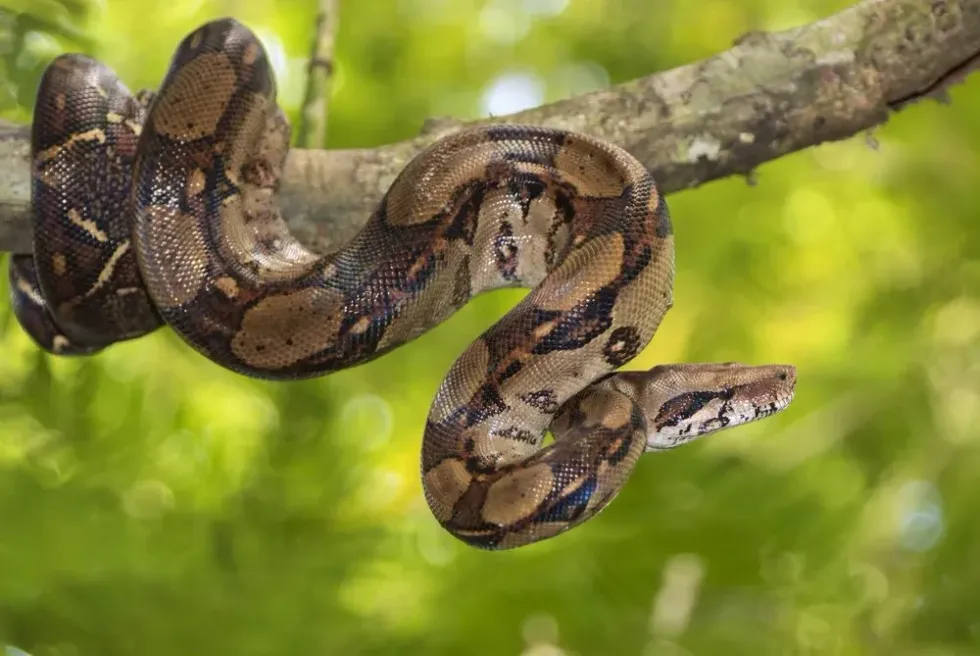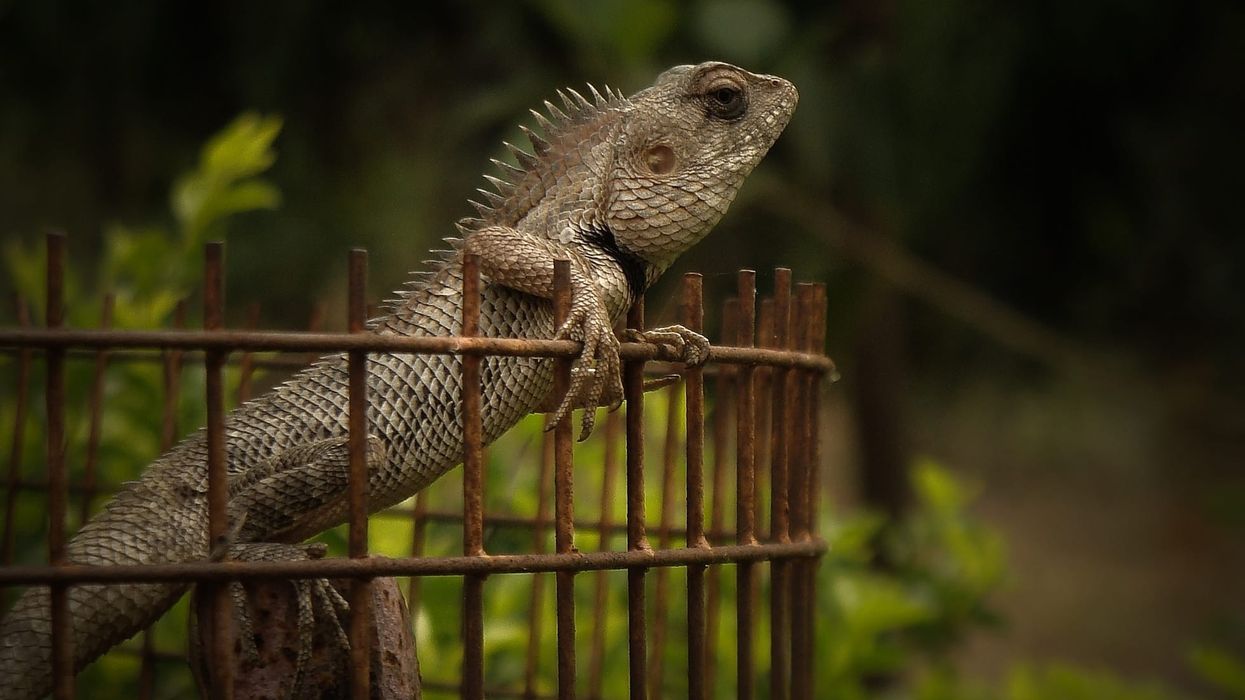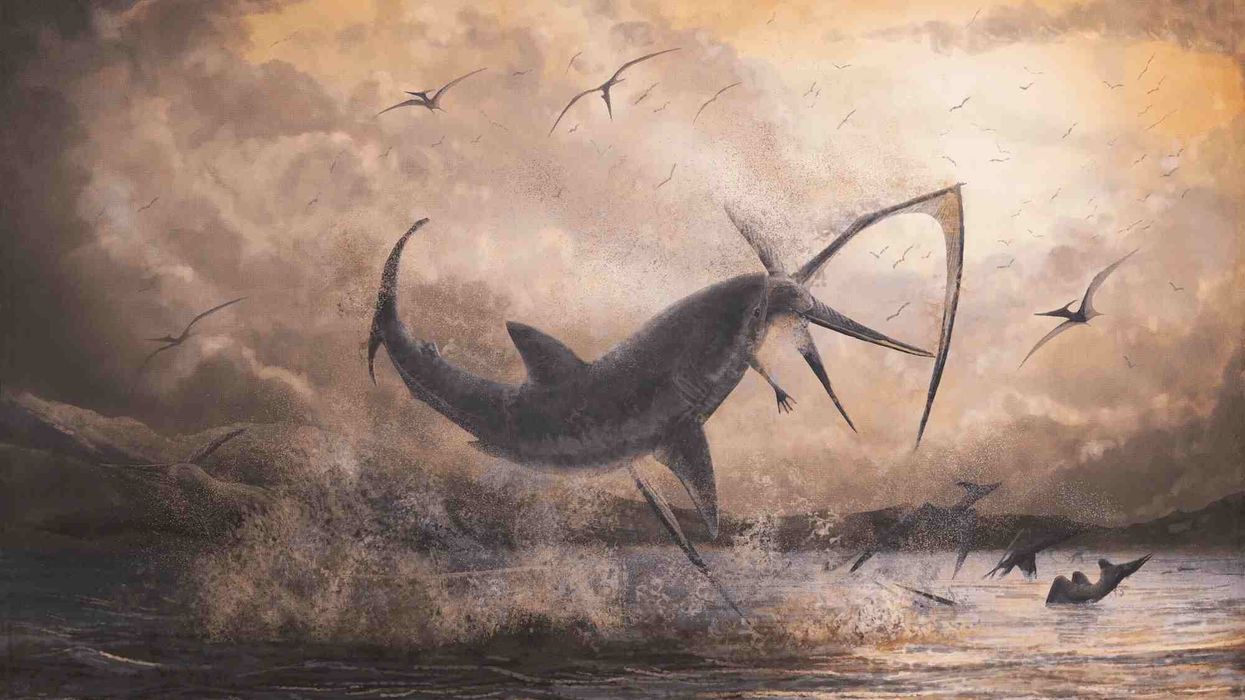The boa constrictor is a type of large snake that is found scattered throughout Central and South America. All the way from Argentina to Northern Mexico. A few species are also found in the Caribbean islands.
These snakes are about 3-13 ft (0.9-4 m) long. They have light tan, brown or yellow bodies with darker, saddle-shaped markings on them. They can be found in rainforest clearings, woodlands, grasslands, tropical forests, and even semi-deserts.
They have a vast habitat. There are almost nine recognized subspecies of the boa constrictor.
The Argentine boa constrictor, redtail boa constrictor, and Ecuadorian boa constrictor are a few of them. These boas are primarily terrestrial but can also be arboreal. The females give birth to fully formed neonates that become independent after a few minutes of their births.
If you want to read more interesting animal facts, then take a look at these articles about the green anaconda and Olive Ridley sea turtle.
Boa Constrictor Interesting Facts
What type of animal is a boa constrictor?
Boa constrictors are a type of non-venomous snakes belonging to the Boidae family. They have a few subspecies and are generally found in South America.
What class of animal does a boa constrictor belong to?
The boa constrictor belongs to the Reptilia class of the Animalia kingdom.
How many boa constrictors are there in the world?
The exact number of boa constrictors left in the world is unknown. However, they are not listed as Endangered in the IUCN Red List, and at least 20 subspecies of these snakes can be found in the world. But their populations are decreasing because of poaching and exotic pet trades.
Where does a boa constrictor live?
The boa constrictor is found throughout northern South America in the countries of Colombia, Argentina, Uruguay, Peru, Venezuela, and many more. They are scattered throughout South America and in Northern Mexico as well.
What is a boa constrictor's habitat?
The boa constrictor is found throughout a vast part of Central and South America and can also be found in a few Caribbean islands. The boa constrictor habitat is very varied in nature.
Even though they are mostly found in the clearings of rainforests or on the edges, they can also be found in grasslands, tropical forests, woodlands, and deserts. They are also sometimes seen in agricultural fields.
These snakes are largely terrestrial even though they are great swimmers. They prefer the land to the water. But these boas are also semi-arboreal. They are mostly seen on the ground but can also be found in trees. The neonates show a more arboreal nature than the adults.
Who do boa constrictors live with?
Boa constrictors are typically solitary animals. They do not come into contact with other snakes of their species very often. Only during the mating season, they can be seen together.
How long does a boa constrictor live?
Boa constrictor lifespan can be as long as 20-25 years in the wild. In captivity, however, they tend to live longer and can live for up to 30-35 years.
How do they reproduce?
Boa constrictors are one of the snake species that give birth to live young instead of laying eggs. The mating usually occurs in the warm dry season.
April to August is their ideal mating season. Both males and females can have more than one mating partner in a season, but not even half the female population gets pregnant in the mating season. This is because carrying the young is a hard job for boa constrictor females and only healthy ones can do it.
Their gestation period is about five to eight months long and they can give birth to up to 10-65 neonates. These neonates are fully formed when born and become independent after a few minutes of birth.
What is their conservation status?
Boa constrictors do not have a special place in the IUCN Red List. They are Not Evaluated but a healthy number of them live in Central and South America.
But the subspecies that are native to the offshore islands have been hit the hardest by the pet trade and poaching. A few subspecies' populations are Endangered because of this. Boa constrictors are hunted for their skin and meat.
Other than that, road mortality and habitat loss also affected the populations of boa constrictors in the wild. The red-tailed boa, which consists of boa constrictors as well as imperators, are given the status of Least Concern.
Boa Constrictor Fun Facts
What do boa constrictors look like?
The boa constrictor is a large snake from the Boidae family that can be found in Central and South America. They have modest-sized bodies that can be 3-13 ft (0.9-4 m) long and weigh up to 44-100 lb (20-45 kg). A few specimens can be even larger.
These snakes have some distinctive features that can help to identify them in the wild. The boa constrictor snake has a long and heavy body that is usually a light tan, cream, or gray.
They have oval-shaped marks of darker browns and blacks on the lighter background. These light marks are called saddles present on each side. The head of boa constrictors has a narrow line down the middle.
They are well-camouflaged creatures that have skin that helps them blend into the surroundings. Their markings are very distinctive.
The females of this species are usually larger than the males. They have pelvic spurs that are considered to be the remnants of hind legs. These pelvic spurs are larger in males than females.
Boa constrictors are indeed large snakes in ratio to humans and other smaller snakes. In reality, however, they are only a modest-sized species because there are snakes that are much much larger than the boa constrictor. These snakes can have albinism. An albino boa constrictor is a beautiful creature that has a lot of value as an exotic pet.

How cute are they?
Boa constrictors are not as traditionally cute as some species of smaller snakes. They are big and strong and that can be very intimidating. They probably won't be considered cute by the majority of people.
But these gentle giants are cute for those who like big snakes. They are tame creatures that can be friendly unless threatened. Boa constrictor neonates are very cute.
How do they communicate?
Boa constrictors have little reason to communicate with each other. In the mating season, the males try to find the females that are scattered throughout a large area. But like all snakes, the boa constrictor depends a lot on its sense of taste and smell.
They continuously flick their tongue to perceive their surroundings. These snakes can also feel the vibrations of the earth through their bodies and the vibrations of air through their jaws. This is how they perceive threats and look for prey.
How big is a boa constrictor?
Boa constrictors are large snakes that reach the average length of 3-13 ft (0.9-4 m) across species. Female boa constrictors tend to be longer than male boa constrictors. The females are 6.5-10 ft (2-3 m) on average, whereas the average length of male Boa Constrictors is about 5-8 ft (1.5-2.5 m).
How fast can a boa constrictor move?
The boa constrictor moves at the speed of 1 mph (1.6 kph) on average. They are terrestrial animals and move very slowly. They also show arboreal qualities and are found spending a lot of time on trees.
How much does a boa constrictor weigh?
The weight of the boa constrictors can vary upon each individual snake. The average weight of boa constrictors across species is about 44-100 lb (20-45 kg). But some boa constrictors can weigh 33 lb (15 kg) wherein others can weigh up to 110 lb (50 kg) or more. Their weight depends on their growth and the subspecies.
What are their male and female names of the species?
Like all snakes, there are no special names attributed to the male and female boa constrictors. They are called male and female boa constrictors.
What would you call a baby boa constrictor?
Like all other snakes, baby boa constrictorrs can be called neonates or snakelets. Neonate is the most common name for snake young.
What do they eat?
The boa constrictor diet comprises a range of animals. Since they are a species of large snakes, the size of their prey also varies vastly.
Starting from rodents, birds, small monkeys, pigs, and other small mammals as well. The Boa Constrictor is an ambush predator. This means they wait patiently for their prey to arrive and attack them when they are close enough.
But some species of the boa constrictor are known to actively hunt around the area that they live in. This especially happens when prey populations are low in an area.
They hunt nocturnally because they have great vision. In captivity, boa constrictors are given rats and other rodents. The young need to be fed more often than the adults.
In the wild as well, the boa constrictor does not hunt for almost a month after filling their stomachs. The young boa constrictors in the wild eat small lizards and mice.
These snakes, or any other snake in the constrictor group, break the bones of their prey by coiling their bodies around the other animal and squeezing. Their jaws can stretch really wide, and they swallow their prey whole. Because of this, it takes them a long time to digest their food.
Are they poisonous?
Boa constrictors are non-venomous snakes. Even though they are big in size, their bites do not contain any venom. For feeding, they simply crush the bones of their prey with their bodies and swallow them whole.
Would they make a good pet?
Yes, boa constrictors can make good pets. In fact, the boa constrictor is very popular as an exotic pet in countries where adopting snakes is legal.
Even though they receive a bad rep for being dangerous animals, boa constrictors are not violent creatures at all. This snake might be intimidating as they are very large, but these boas virtually never attack humans.
They do not need to be fed very often. But since they need to be fed rodents, you have to make sure that they are good quality rats and mice.
Source the rodents from good stores so there are no mites or other diseases that can get into your pet or your house. The enclosure that the boa constrictor is kept in needs to be big enough for the animal to stretch to its full length.
Make sure to buy an enclosure large enough so the animal can exercise in it. The boa constrictor size can be intimidating but they only attack humans if they are handled too roughly.
But only people that can spend a lot of time on this large snake should think about getting a boa constrictor. They are more suited for adults than children.
Did You Know...
Boa constrictors are frequently kept and bred in captivity and they behave very well too.
Boa constrictors are excellent swimmers, but they do not like the water and spend most of their lives terrestrially.
They do not attack humans generally but can bite or try to strangle if they feel threatened. These snakes may try to eat a cat or dog and injure them by constriction.
They are one of the very few animals whose common name and scientific name are the same. And they get the name from the method of their preying- constriction.
Different Types Of Boa Constrictors
There are nine recognized subspecies of the boa constrictor.
These are Argentine boas that are found in Argentina and Paraguay, Orton's boas that are found in South America, Red-tailed boas that are also found in South America, Pearl island boas that are found off the coast of Panama in the Pearl Islands, Amaral's boas that are found in Brazil, Paraguay and Bolivia, Ecuadorian boas that are found in Ecuador, and Peruvian long-tailed boas that are found in Peru are a few of these recognized species.
These boas all have a few different features that make them all unique.
Does anything eat boa constrictors?
This large species of mighty snakes seems to be untouchable. But you should know that there are a few animals that can eat these boas. Especially when they are young, boa constrictors can be eaten by eagles, hawks, and alligators.
When they grow up, they are not as frequently eaten by animals. But still, some jaguars might hunt fully grown boas if they are not overwhelmingly large. In the wild, very few animals are absolutely safe.
Here at Kidadl, we have carefully created lots of interesting family-friendly animal facts for everyone to discover! Learn more about some other reptiles including the sand lizard, or bog turtle.
You can even occupy yourself at home by drawing one on our boa constrictor coloring pages.










